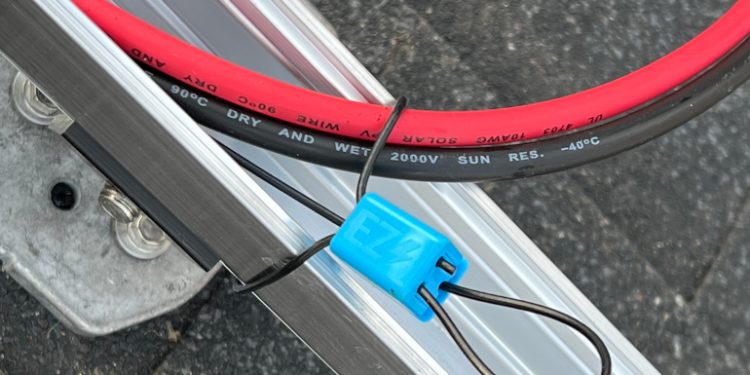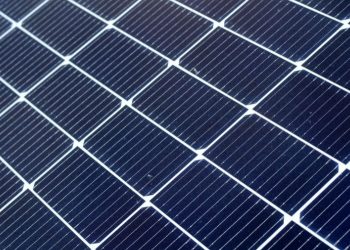Solar Power World has dedicated its March 2024 coverage to installation tips for solar contractors big and small. You can read the rest of our Q&As in the magazine and online here.
For insight into the “balance of system component” segment, SPW talked with Mitch Hoffman, director of marketing for EZ Solar Products, to learn more about cable and wire management on rooftops.
Are cable zip ties a viable option for cable management?
 While plastic zip ties can be a cheap and convenient option in the beginning, they are not suitable in the long-term and will often fail over time due to exposure to weather and UV rays. Metal ties rub against the wires and cut through over time, leading to wire failure. Solar installations are expected to last 25+ years, and the products used for cable management need to perform for the lifetime of the asset. Any failure can lead to costly service calls and truck rolls. While there are some products that have addressed some of the longevity issues and are gentle enough on wires, they are harder to use, requiring tools to crimp and cut each cable tie leading to greater time and effort required for installers. Crimps can also fail if not performed correctly, leading to additional cost to service. To address all these areas EZ Solar recently launched CableLoc, a tool-free wire management solution that will last the life of the asset. It has a stainless-steel cable wrapped in a round polymer jacket to ensure it is gentle on wires while being incredibly durable and able to hold 120 lbs. And it’s easy to use, patented fastening and slack storage features ensure an efficient installation without the use of tools for crimping and cutting. And this is all backed by a 25-year warranty.
While plastic zip ties can be a cheap and convenient option in the beginning, they are not suitable in the long-term and will often fail over time due to exposure to weather and UV rays. Metal ties rub against the wires and cut through over time, leading to wire failure. Solar installations are expected to last 25+ years, and the products used for cable management need to perform for the lifetime of the asset. Any failure can lead to costly service calls and truck rolls. While there are some products that have addressed some of the longevity issues and are gentle enough on wires, they are harder to use, requiring tools to crimp and cut each cable tie leading to greater time and effort required for installers. Crimps can also fail if not performed correctly, leading to additional cost to service. To address all these areas EZ Solar recently launched CableLoc, a tool-free wire management solution that will last the life of the asset. It has a stainless-steel cable wrapped in a round polymer jacket to ensure it is gentle on wires while being incredibly durable and able to hold 120 lbs. And it’s easy to use, patented fastening and slack storage features ensure an efficient installation without the use of tools for crimping and cutting. And this is all backed by a 25-year warranty.
What makes an ideal junction box on the roof?
 An ideal junction box should have a few key qualities. First, it needs to be durable enough to last 25+ years, the same lifetime as any quality solar system installation. That means being able to withstand exposure to the elements including severe weather, heavy rain and UV exposure. Second, it needs to have several layers of water protection to ensure no water will leak through the roof and into the home after install or collect inside the box with no ability to escape. And last, it needs to be easy to use and installer-friendly. This can be accomplished by using lightweight, durable materials and an adaptable design to allow the installer to fit the junction box to their install needs.
An ideal junction box should have a few key qualities. First, it needs to be durable enough to last 25+ years, the same lifetime as any quality solar system installation. That means being able to withstand exposure to the elements including severe weather, heavy rain and UV exposure. Second, it needs to have several layers of water protection to ensure no water will leak through the roof and into the home after install or collect inside the box with no ability to escape. And last, it needs to be easy to use and installer-friendly. This can be accomplished by using lightweight, durable materials and an adaptable design to allow the installer to fit the junction box to their install needs.
EZ Solar offers a range of residential solar junction box solutions for any roof type and install, including comp shingle, tile and universal rail-mounted options. Each box is made of a durable UV-rated polycarbonate material that is built to last 25+ years. There are pre-drilled weep holes to ensure that any water and condensation can escape the box, and multiple layers of flashing and water protection built-in to each box so no water will leak through the roof. The box is lightweight, so getting it up the ladder onto the roof is easy and the installer can drill through multiple sidewalls to fit it to their installation. And drilling through polycarbonate is far easier on your drill bits than drilling through metal. As with all EZ Solar products, each junction box has a 25-year warranty.
How do you adapt junction box needs to different residential roof types?
EZ Solar has junction boxes for any residential roof type that an installer would need. While composite shingles are common, having an easy-to-use tile solution is also key. The JB-2 has all the same great features as our composite shingle junction boxes but includes a malleable universal flashing that can be formed over several different tile types, ensuring protection from any water intrusion. And one of our newest products is the JB-3, a rail-mounted junction box that will fit any type of rail. This is a great option for any installer that does exterior conduit runs.
What risks should solar contractors be aware of while handling cables?
First and foremost, solar contractors need to think long-term. While using quick and cheap options for cable management may seem like the best option initially, they can cost you more in the long run due to subsequent failures and service calls. Using a better product in the beginning can ensure a permanent solution that will last. This also means using a product that is gentle on wires and cables.
Over the course of 25+ years, with wind, rain and UV exposure, the cables will naturally have some rubbing and friction against any cable management product. Metal ties can lead to damaged cables and failures, especially when flat against the wire. A round cable management product with a coating will be far gentler on cables and protect against cable damage and any potential failures. While there are some products that address these concerns, they often require tools to crimp and cut the cable tie. Each crimp needs to be perfect, as poor crimps can lead to failures. And all of this takes time. A tool-free solution that removes these potential points of failure all while being easier to use is the best of all worlds.
What advice would you offer someone handling electrical balance of system components for the first time?
Electrical balance of systems (eBOS) is often overlooked but can be a “make or break” for the life of your system’s performance. Investing a little more up-front can protect you from much larger costs from service calls and frustrated customers down the road. Make sure to use eBOS products that last the life of the asset and complement the equipment. If not, expensive truck rolls and system downtime could be in your future.


















